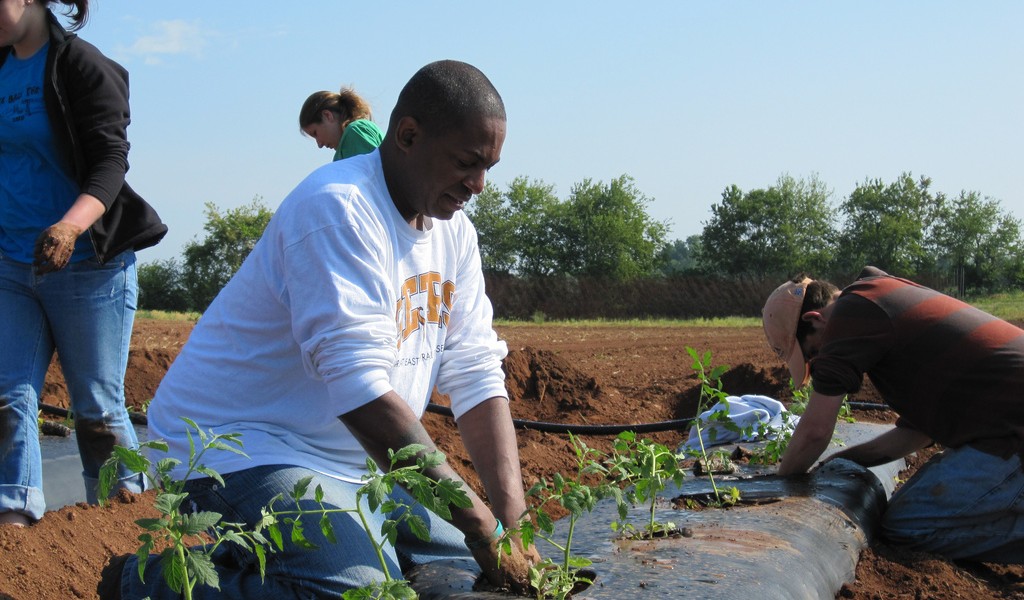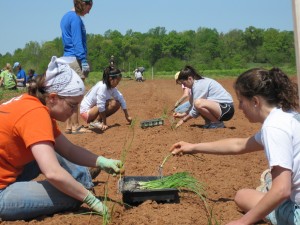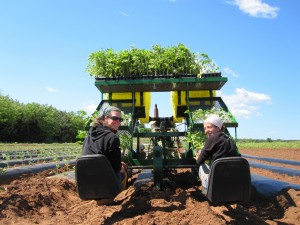Charlottesville, VA
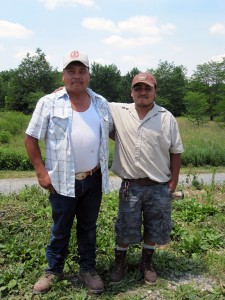
Adolfo and Jose Calixto of Singing Earth Farm. Photo above and all photos below © Emily Manley, used by permission.
This month we talked with three folks involved with Local Food Hub, a non-profit organization working with over 50 family farms and food producers within 100 miles of Charlottesville, Virginia. This food hub sells local produce to over 120 businesses and institutions and 45 public schools. We learned how Local Food Hub provides local food for much of their community while educating and training next generation farmers.
Co-founders Kate Collier and Marisa Vrooman started Local Food Hub in Charlottesville, Virginia, in July of 2009, to make a change in their local food system. Kate, with roots in the local food arena, and Marisa, with roots in the non-profit field, wanted to help farmers meet the challenge of balancing work in the fields while fulfilling the marketing, accounting, delivery and shipping needs to keep a farm business going. They saw great opportunity because the demand for local food was much greater than the supply in Charlottesville. Their solution became Local Food Hub—a local food aggregation and distribution center.
When the food hub first began, Kate and Marisa looked to three existing models, each Farm Aid partners. For knowledge in farming, local food and sustainability they looked at the Intervale Center in Burlington, Vermont. They looked to Appalachian Sustainable Development in Virginia and Tennessee for their distribution methods. Finally, the Appalachian Center for Economic Networks (ACEnet) in Ohio taught them a great deal about networking. Kate and Marisa integrated this newfound knowledge with their own experience to create an organization of their own.
Emily Manley, the Communications and Outreach Manager for Local Food Hub, explains how the non-profit operates to mutually benefit the farmers, buyers, consumers and community of Charlottesville. To begin, Local Food Hub works closely with area farmers to determine a fair price for their products. They purchase local food from their fifty member farms to sell and distribute to businesses and institutions including the University of Virginia (UVA), UVA Hospital, nursing homes and public schools. Many of the larger businesses and institutions are markets that farmers were unable to access before the food hub came into being. Local Food Hub farmers are still able to sell their produce at local markets to maintain their direct relationship with consumers, but they also drop their produce off at the hub’s warehouse, which allows them to pass on the time- and resource-intensive task of marketing and distribution to larger buyers.
Jose Calixto, owner of Singing Earth Farm in Wainsborough, VA, has been a producer member of Local Food Hub for over a year. Jose and his father Adolfo have farmed their land for seven years and Jose says his favorite part about farming is, “Growing stuff!” With Local Food Hub’s help, he can focus on doing just that. Before last year Jose and Adolfo were working on twenty acres. Once they began growing for Local Food Hub they had to rent thirty more acres to keep up with demand. Jose says, “Local Food Hub is one of our two largest customers and takes a lot of our produce.”
Jose and Adolfo drop off produce at the Local Food Hub warehouse twice a week. “[Local Food Hub calls] once a week and asks me what is available. I tell them what we have and they call back to let me know what to drop off,” explains Jose. During the busy season in late August, Jose occasionally drops off a 14-foot truck full of watermelons at a time!
In order to avoid competing with direct sales at farmers markets, Local Food Hub sells only wholesale. Since 2009, they have purchased nearly $500,000 worth of local food and have seen their sales grow 300%. Emily is particularly excited that Local Food Hub’s connection with the local school system is strengthening, putting fresh, healthy local food on more tables in school cafeterias. Much of the produce Jose sells through the hub goes to feed local school children.
During the wintertime when production is slow, Local Food Hub brings together their farmers and buyers to plan for the next growing season. They ask the buyers what the demand will be so they can map it out with the farmers. Emily says, “Before this, farmers were operating in the dark and this process has resulted in a very efficient planning piece for farmers.” To value the identity of each individual farm, Local Food Hub never mixes produce from different farms. So a school will get apples from just one farm one week, and may get apples the next week from another farm. While all of the food is labeled “Local Food Hub,” the information for the particular farm that the produce comes from is also noted.
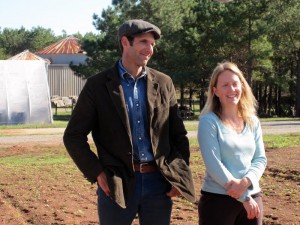 Another main component of Local Food Hub is their 60-acre educational farm located on a plot of 1,300 acres purchased by Dave Matthews so that the land could be saved from development. Adrianna and Steve Vargo have been the educational farm managers for over a year and have been farming for more than ten years. The farm raises certified organic vegetables, perennial crops and 250 chickens for eggs. The goal of the educational farm is to create enough farmers to supply the demand for local food in the region.
Another main component of Local Food Hub is their 60-acre educational farm located on a plot of 1,300 acres purchased by Dave Matthews so that the land could be saved from development. Adrianna and Steve Vargo have been the educational farm managers for over a year and have been farming for more than ten years. The farm raises certified organic vegetables, perennial crops and 250 chickens for eggs. The goal of the educational farm is to create enough farmers to supply the demand for local food in the region.
The educational farm provides a workshop series, apprenticeship programs and volunteer opportunities. The workshops include continuing learning for professional farmers, as well as workshops for homesteaders and backyard gardeners interested in growing their own food at home.
Adrianna says, “An ideal candidate for an apprentice is someone who also has an investment in the local area.” The hope is that after training, apprentices will become part of the regional food supply that includes Charlottesville. This year, the program has four apprentices and one senior apprentice. The senior apprentice became a farm mentor after dedicating himself to the program last year and recently began farming an acre of his own land.
Local Food Hub has had a highly valuable impact on Charlottesville, Virginia. With their organization, planning and knowledge, they’ve improved the food system by increasing access to local food for their community, strengthening markets for current farmers, training new farmers and generating interest in local agriculture and good food. According to Emily, “Essentially we’re growing new farmers.” And in the process, Local Food Hub has itself become a model for putting local food on local plates!
Further Reading
- Is Good Food Elitist? Our staffer, Matt, sure doesn’t think so. Check out this month’s Putting it into Practice to go beyond name-calling and explore what good food means for all of us.
- Read our Ask Farm Aid column on food hubs and how they are helping to get good food from family farmers onto more people’s plates.
